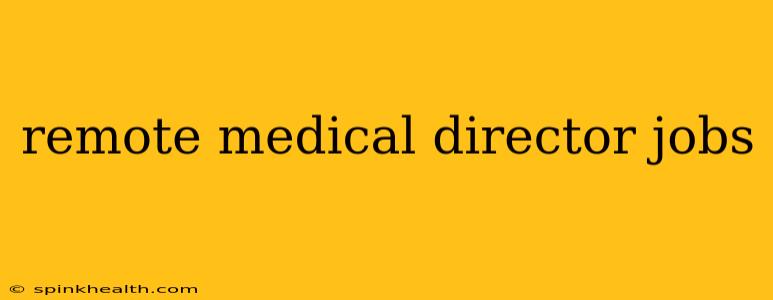Remote Medical Director Jobs: Leading Healthcare from Anywhere
The world of medicine is evolving, and with it, the opportunities for medical professionals. Gone are the days when a medical director role strictly meant being tethered to a physical office. Today, the rise of telehealth and remote work has opened the door to exciting remote medical director jobs, allowing physicians to leverage their expertise from anywhere with a reliable internet connection. But what exactly does this role entail, and what are the unique challenges and rewards? Let's delve into the fascinating world of remote medical director positions.
This isn't just about checking emails from a beach; it's about strategic leadership, clinical oversight, and navigating the complexities of modern healthcare—all remotely. Imagine shaping the future of patient care from the comfort of your home, a mountain cabin, or a cozy café overlooking a breathtaking vista. Intrigued? Let’s unpack the intricacies of these increasingly sought-after positions.
What Does a Remote Medical Director Do?
A remote medical director's responsibilities mirror those of their on-site counterparts, albeit delivered through digital platforms. They are responsible for the overall clinical quality, compliance, and operational efficiency of a healthcare organization, often a telehealth company or a large health system with a robust remote care program. Their typical duties include:
- Overseeing clinical operations: This involves ensuring adherence to established protocols, guidelines, and best practices, often using remote monitoring technologies and data analytics. They might review patient charts, participate in virtual consultations (though usually not directly with patients), and provide guidance to clinical staff.
- Quality assurance and improvement: Medical directors in remote roles play a crucial part in maintaining high standards of care. This includes analyzing data to identify areas for improvement, implementing new technologies, and creating training programs for remote clinicians.
- Compliance and regulatory oversight: Staying compliant with ever-changing regulations is paramount. Remote medical directors need to ensure the organization meets all legal and ethical standards in providing virtual care.
- Staff supervision and mentorship: Leading and mentoring a remote team requires strong communication and leadership skills. Regular virtual meetings, performance evaluations, and providing support are all critical elements of this role.
- Strategic planning and development: Remote medical directors frequently participate in strategic planning sessions, contributing their clinical expertise to guide the organization's future direction.
What are the Qualifications for a Remote Medical Director Job?
The specific requirements for a remote medical director role will vary depending on the organization and the type of healthcare setting. However, some common qualifications include:
- Medical license: A valid and unrestricted medical license in the relevant state(s) of practice is essential.
- Board certification: Board certification in a relevant specialty is highly desirable, demonstrating a high level of clinical expertise.
- Significant experience: Several years of experience as a physician, preferably in a leadership role, are typically required.
- Experience with telehealth: Experience with telehealth platforms and remote patient monitoring is becoming increasingly essential.
- Strong leadership and communication skills: Effective communication and leadership skills are crucial for managing remote teams and navigating the complexities of virtual care.
- Technological proficiency: Comfort with various software and telehealth technologies is a must.
What are the Advantages of a Remote Medical Director Job?
The benefits of working as a remote medical director are numerous:
- Flexibility and work-life balance: The ability to set your own hours and work from virtually anywhere offers unmatched flexibility and improved work-life balance.
- Geographic independence: You're no longer limited by location. You can live where you want and still maintain a fulfilling career.
- Reduced commute time: Say goodbye to traffic jams and long commutes!
- Increased autonomy: Many remote roles offer a greater degree of autonomy and decision-making power.
What are the Challenges of a Remote Medical Director Job?
While the advantages are significant, it’s important to acknowledge the potential challenges:
- Isolation and loneliness: Working remotely can sometimes lead to feelings of isolation, requiring proactive measures to stay connected with colleagues and maintain a strong support network.
- Technical issues: Reliable internet access and technology are critical for success. Technical glitches can disrupt workflow and impact patient care.
- Communication challenges: Clear and effective communication is crucial in a remote setting. Utilizing various communication platforms and strategies is essential.
- Time zone differences: Working with teams across different time zones can pose scheduling challenges.
How Do I Find Remote Medical Director Jobs?
Finding remote medical director positions often requires a strategic approach. Start by networking within your professional circles, attending virtual conferences, and leveraging online job boards specializing in healthcare and remote work. Tailor your resume and cover letter to highlight your relevant experience and skills, emphasizing your proficiency with telehealth technologies.
The rise of remote medical director jobs represents a significant shift in the healthcare landscape. For physicians seeking greater flexibility, autonomy, and a better work-life balance, this emerging career path presents a compelling opportunity to lead and innovate in the ever-evolving world of medicine.

